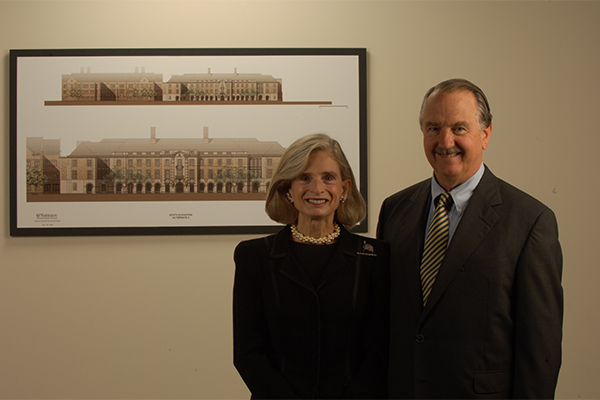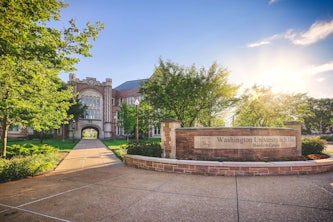Bayly named inaugural Lee Hunter Distinguished Professor
Philip V. Bayly, an innovative researcher of waves and oscillations in the mechanics of cells and biological tissues, has been named the inaugural Lee Hunter Distinguished Professor in the McKelvey School of Engineering

Philip V. Bayly, an innovative researcher of waves and oscillations in the mechanics of cells and biological tissues, has been named the inaugural Lee Hunter Distinguished Professor in the McKelvey School of Engineering at Washington University in St. Louis.
Bayly, who has been chair of the Department of Mechanical Engineering & Materials Science since 2008, was installed Oct. 28, 2020.
“It is fitting that Phil Bayly will be taking on the Hunter professorship. Like Lee Hunter, Professor Bayly’s work showcases the importance of creativity in engineering,” Chancellor Andrew D. Martin said. “This creativity will certainly revolutionize the way society understands and treats head trauma.”
“Lee Hunter’s work revolutionized the automotive industry, and his legacy persists, thanks to his stepson, Stephen Brauer,” Martin said. “We are grateful for the Brauers continued, generous support of Washington University in St. Louis, and honored to help keep Hunter’s legacy alive with the Lee Hunter Distinguished Professorship.”
“Phil Bayly is not only an exceptional engineering researcher who is looking at the mechanics behind traumatic brain injury as well as other areas of mechanobiology, but he’s also an outstanding engineer, as well as leader and teacher,” said Aaron F. Bobick, the James M. McKelvey Professor and dean of the McKelvey School of Engineering. “While Phil will tell you that his best days are the ones he gets to work in his lab with his students on their research, his engineering leadership is always present. When the COVID-19 pandemic created a potential for a shortage of ventilators, he organized a team of mechanical and electrical engineers to create emergency ventilators that could be locally manufactured and immediately deployed. We are grateful to the Brauer family for continuing to support outstanding faculty such as Phil Bayly as a way to honor Lee Hunter and his legacy.”
Since Bayly has been chair of the department, undergraduate and PhD student enrollment have each increased by 30%, while master’s degree enrollment has increased by 374%. Faculty research expenditures are up 237%; and department faculty increased from 10 tenured/tenure-track faculty and one teaching faculty member in 2008 to 17 tenured/tenure-track faculty, seven teaching faculty members and two professors of the practice as of October 2020.
In addition, Bayly provided guidance on the interior spaces of Henry A. and Elvira H. Jubel Hall, which became the department’s home in Summer 2019. The building, which contains classrooms, laboratories, faculty offices, study areas and the Spartan Light Metal Products Maker Space, allows mechanical engineers to work closely with physicists, chemists, biologists, and chemical and biomedical engineers to promote the convergence of mechanics, materials science and nanotechnology.
Bayly’s research focuses on impact, vibration, wave motion and instability in mechanical and biomedical systems. He uses magnetic resonance imaging (MRI) to investigate the mechanics of brain injury and brain development. Recently, he and members of his lab have been collecting data on how the brain moves in response to slight vibrations, in order to build mathematical simulations of head trauma. His research has been funded by the National Science Foundation, the Whitaker Foundation and the National Institutes of Health.
Bayly joined the Washington University in St. Louis faculty in 1993. In 1996, he received the prestigious Faculty Early Career Development (CAREER) award from the National Science Foundation. He received the Richard Skalak Award for Best Paper from the Journal of Biomechanical Engineering in 2013 and 2018. In recognition of his commitment to the intellectual and personal development of Washington University students, Bayly received the Founder’s Day Distinguished Faculty Award in 2014. In 2004, he was awarded Engineering Professor of the Year and he has twice received the School of Engineering & Applied Science "Big Fish" Award for graduate student mentoring.
Bayly earned a bachelor of arts degree in engineering science from Dartmouth College, a master of science in engineering from Brown University and a doctorate in mechanical engineering from Duke University. Before pursuing a doctorate, he worked as a research engineer for the Shriners Hospitals and as a design engineer for Pitney Bowes.
The Lee Hunter Distinguished Professorship was established in 2017 by Stephen F. and Camilla T. Brauer, longtime supporters of Washington University and the McKelvey School of Engineering, during the Leading Together campaign.
Lee Hunter founded Hunter Engineering in 1946. Prior to beginning his business career, Mr. Hunter studied at Westminster College and Washington University and served in World War II as a Lieutenant of Engineers for the U.S. Army. Mr. Hunter invented numerous products that revolutionized the automotive service industry worldwide. His inventions included the “Kwikurent,” a device that could rapidly charge a car battery, the “Lite-A-Line” wheel alignment system and the “Tune-In” on-car balancer. In 1992, Mr. Hunter was posthumously inducted into the Automotive Hall of Fame. Mr. Hunter served on the Washington University Engineering School Task Force beginning in 1979 and then the school’s National Council in the 1980s. He was a member of the university’s Board of Trustees from 1982-1986. In 1983, he established the Lee Hunter Professorship in Mechanical Design, currently held by mechanical engineering professor Mark Jakiela.
Today, Stephen Brauer serves as the chairman of Hunter Engineering. In this role, he continues to lead in the style of Lee Hunter — driving excellence by investing in people and innovation. The company is a global leader in the automotive products service industry.

The Brauer family is dedicated to advancing the mission of Washington University. Stephen Brauer is a member of the Board of Trustees and the McKelvey Engineering National Council. Camilla Brauer serves on the Eliot Society Danforth Circle Committee. In 1996, she was recognized as the Outstanding Fundraising Volunteer in the United States by the National Society of Fundraising Executives. Together, the Brauers have been honored by the university with the Jane and Whitney Harris St. Louis Community Service Award, the Eliot Society Search Award, and the Robert S. Brookings Award.
Among their many generous gifts, the couple endowed the Stephen F. and Camilla T. Brauer Distinguished Professorship in Biomedical Engineering and provided the lead gift for the construction of Stephen F. and Camilla T. Brauer Hall.



